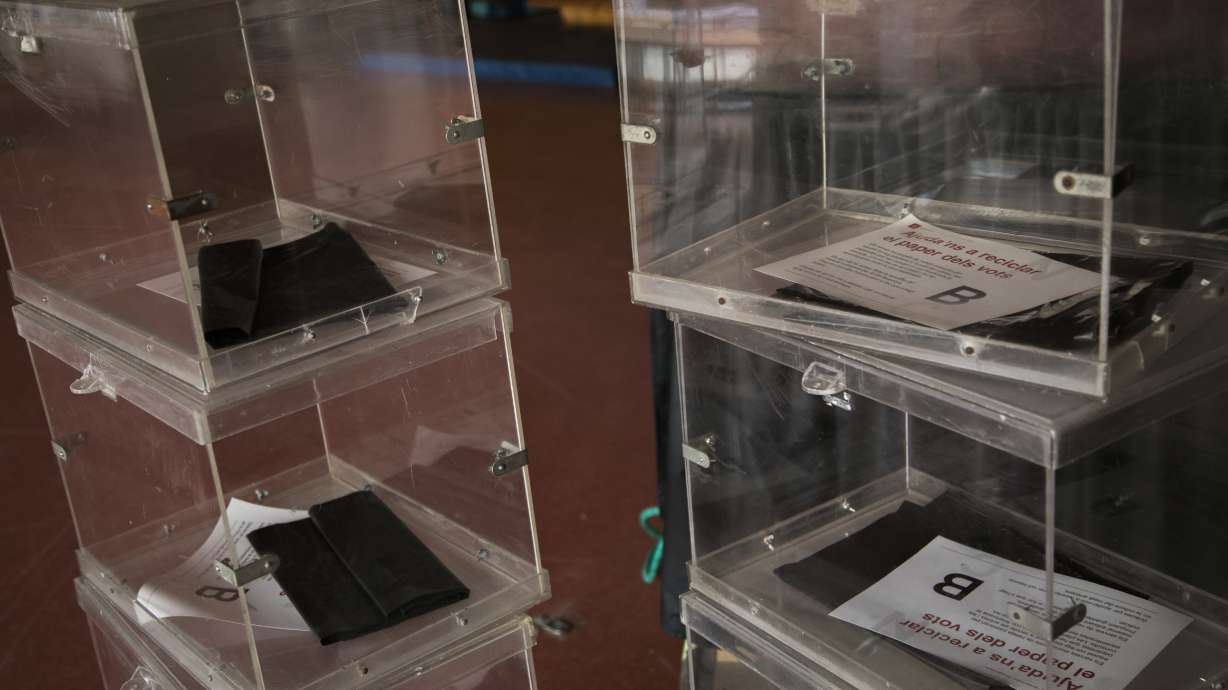Estimated read time: 4-5 minutes
This archived news story is available only for your personal, non-commercial use. Information in the story may be outdated or superseded by additional information. Reading or replaying the story in its archived form does not constitute a republication of the story.
BARCELONA, Spain (AP) — Catalans choose new political leaders in a highly contested election on Thursday that comes in extraordinary circumstances.
The vote was called by central authorities to quell a separatist revolt in Spain's northeastern region. Fugitive and jailed separatist candidates are competing with unionists who claim to be in the best position to return stability and growth to Catalonia. And officials have vowed to fight online misinformation that could taint the electoral outcome.
Here is a look at what's at stake and what is the likelihood the vote will immediately resolve Spain's deepest political crisis since the 1978 return to democracy.
__
WHAT IS THE VOTE?
Catalonia's 5.5 million eligible voters are called to choose 135 representatives for the regional assembly.
Spanish Prime Minister Mariano Rajoy sacked the Catalan cabinet and dissolved the parliament there in late October, following an independence declaration by separatist regional lawmakers. To minimize the backlash, he immediately called a new election.
The chosen date, Dec. 21, is a Thursday, as opposed to Sundays when elections are traditionally held. That could boost the record turnout that pollsters already predict, experts say.
Polling stations open at 9 a.m. (0800GMT) and close at 8 p.m. (1900GMT), with results expected a few hours later.
___
WHY IS THIS ELECTION SO SPECIAL?
Few campaigns feature a fugitive former leader appearing at party rallies via videoconference or top candidate calling in to a radio station from jail.
Former Catalan leader Carles Puigdemont, who heads the Junts Per Catalunya (Together for Catalonia) ticket, is sought by Spanish courts in a rebellion and sedition probe into events leading to the Oct. 27 independence declaration.
He has been in Brussels ever since being sacked, and faces immediate arrest if he returns to Spain.
His former no. 2, the left-republican ERC's Oriol Junqueras, has also tried to campaign from the distance of a jail near Madrid. On Friday, he was reprimanded for calling a Catalan radio program using his limited phone privileges while in custody.
___
MISINFORMATION AND HACKING
Authorities have taken special measures against potential disrupting cyberattacks — Spanish intelligence services identified an alleged misinformation campaign to destabilize Catalonia coming chiefly from Russian territory at the height of the Catalan crisis. The government has not offered evidence of the claims and has so far avoided to directly link the attacks to the Kremlin.
Separatists are also raising questions over the legitimacy of the election and promoting an alternative counting of votes through volunteers deployed at nearly 2,700 polling stations.
Rajoy's government has taken pains to explain that Spain's electoral system has a record of nearly four decades of democratic elections and enough guarantees of safety and impartiality. Votes are counted publicly and manually. Computers are only involved in the last stage of the process, in the publishing of the results.
___
WHAT IS LIKELY TO HAPPEN?
All pre-electoral surveys predict parties in both the separatist and the pro-Spanish unity blocs will fall short of the majority necessary to form a new government — a minimum of 68 parliamentary seats.
Negotiations beginning on Friday will be key, with the latest predictions giving the upper hand to Junqueras' pro-secession party. But surveys put him virtually neck and neck with Ines Arrimadas, a 34-year-old lawyer who leads the homegrown response to separatism, the business-friendly Ciudadanos (Citizens) party.
If the separatists come out ahead, Junqueras' ERC and Puigdemont's supporters could attempt to repeat the separatist coalition ousted earlier this fall, enlisting again the support of the anti-establishment CUP party. But their alliance has suffered the upheavals of the independence push.
Arrimadas, on the other side, faces even more challenges to becoming Catalonia's first female leader. She needs to enlist the support of the local brand of Rajoy's Popular Party, and that of the Socialists of PSC, who are touting their middle-way alternative for larger self-government for Catalonia within Spain.
If neither side gets enough seats, as pollsters predict, the key will be Catalunya en Comu (Catalonia in Common), the regional version of Spain's far-left Podemos party, which opposes independence but wants a legally binding referendum on the issue. Its top candidate, Xavier Domenech, says that he won't support Arrimadas or Puigdemont as new presidents of the region, and that he will instead seek a left-wing coalition with the socialists and ERC.
___
WHAT OTHER ISSUES HAVE EMERGED?
The economy has become one of the most sensitive issues in the streets, amid lower-than-usual tourist arrivals, downward revisions of future GDP growth and the political uncertainty that has prompted thousands of companies to shift their registered addresses outside of Catalonia, long an economic powerhouse.
With the independence issue monopolizing the campaign debate, candidates have been criticized for not being familiar with the region's high unemployment figures and for failing to put forward measures to fight corruption or proposing ways to reverse a widening inequality gap.
Copyright © The Associated Press. All rights reserved. This material may not be published, broadcast, rewritten or redistributed.








